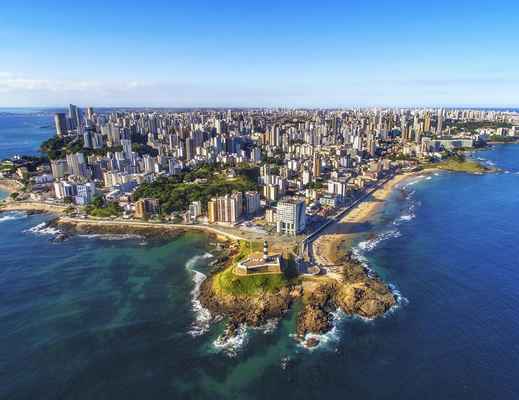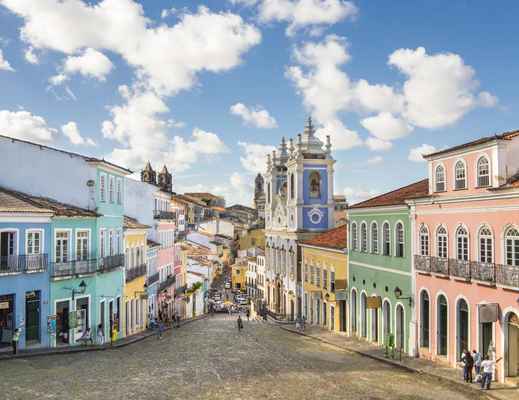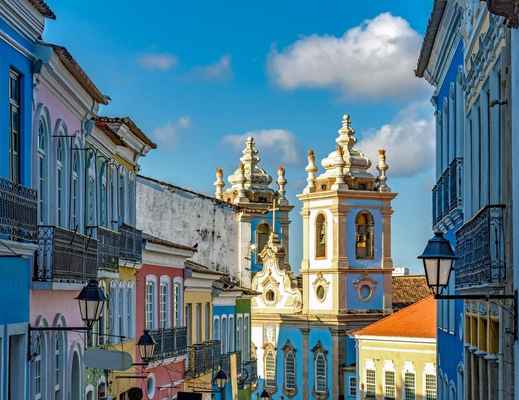


Salvador
South America
/
Brazil
/
Salvador
Situated on Brazil's northeastern coast, Salvador is an energetic city, characterized by a blend of African, Portuguese, and indigenous cultures. The city unfolds across a peninsula, divided into Upper and Lower sections, connected by the legendary Lacerda Elevator. Boasting a tropical climate year-round, warm temperatures and sporadic afternoon showers, especially between April and June, are to be expected.
The essence of Salvador lies within its Afro-Brazilian roots, apparent in everything from the rhythmic drum beats resounding along the historic alleys to the fragrant cuisine emanating from local eateries. The city sways to its unique rhythm where age-old traditions effortlessly intersect with contemporary life, and religious processions coexist with impromptu street fiestas.
Designated a UNESCO site, the district of Pelourinho is Salvador's gem, boasting impeccably preserved colonial architecture painted in bright shades. Here, gold-adorned baroque churches neighbor lively squares where capoeiristas perform their mesmerizing dance-combat. Don't let the Tuesday night drum circles at Terreiro de Jesus slip by where locals and visitors alike gather for a memorable display of Bahian culture.
Food lovers rejoice as moqueca (seafood stew) and acarajé (black-eyed pea fritters) lead the culinary scene. The beach life is equally inviting, with Praia do Porto da Barra providing perfect sunset views and a peek into local lifestyle. For a truly immersive cultural experience, don't miss out on the São Joaquim Market, Brazil's largest open-air market, where a range of items from medicinal herbs to traditional crafts are sold.

Travel Tips for Salvador
What you need to know before traveling here
Getting Around Salvador
A guide to Salvador's local transportation
Covering the full length and breadth of Salvador, the city's bus network is quite extensive. Get a Salvador Card from any terminal station or authorized seller. Buses mark their route numbers and ultimate destinations. For beach neighborhoods and the historic center, tourists tend to use specific lines. Sidestep rush hours (7-9 AM, 5-7 PM).
Practical Tips for Salvador
Things to prepare and best way to visit
Exercise standard precautions, maintain awareness of your surroundings, most importantly during the night. Stick to well-lit, busy areas and avoid flaunting flashy jewelry or carrying valuable items. The tourist police (DELTUR) patrol primary attractions.
The best weather falls between December to March, which also includes the Carnival season. A visit from July to September is also enjoyable with fewer crowds. Try to dodge the rainier period from April to June.
Learning basic Portuguese phrases can come in handy as English is not widely spoken. Master essential phrases for directions, food ordering, and greetings. You'll find that several tourist-oriented enterprises have some English-speaking staff.
The city center is approximately 28km away from Salvador International Airport. You can take the official airport bus which takes around 40 minutes or a taxi/Uber which usually takes 30-45 minutes, depending on the traffic.
The Brazilian Real (BRL) is the official currency. Exchange money at banks or recognized exchange offices. ATMs abound, however, for safety, use the ones in banks. Most establishments accept major credit cards.
See All Practical Tips for Salvador

Travel Tips for Salvador










 Facebook
Facebook Instagram
Instagram TikTok
TikTok Youtube
Youtube Telegram
Telegram
